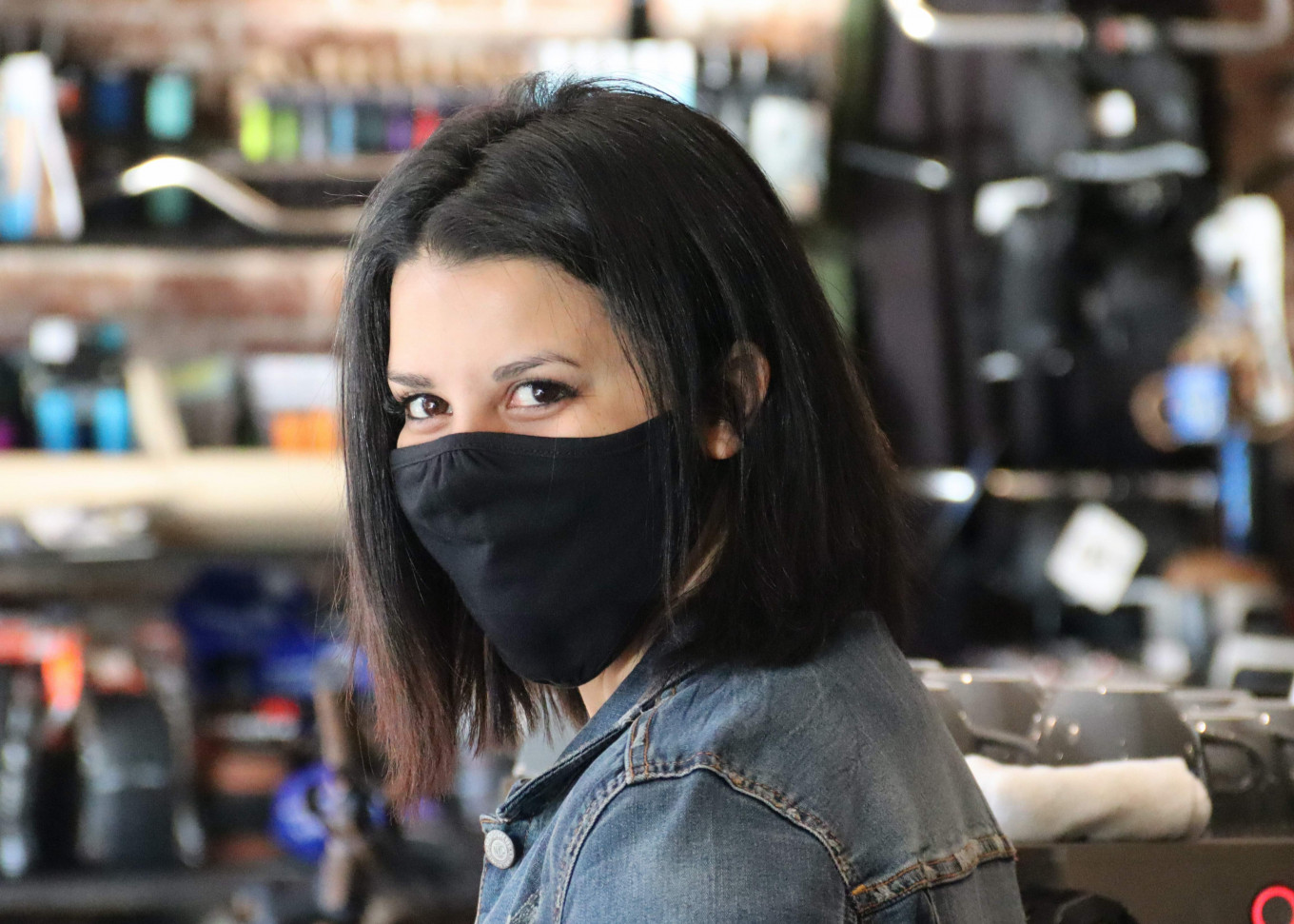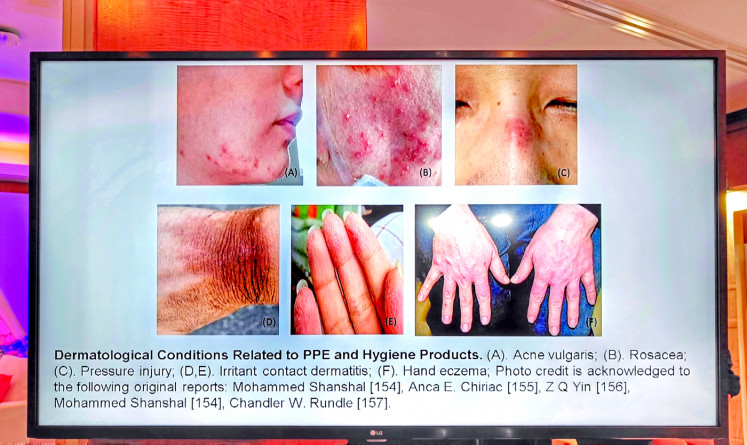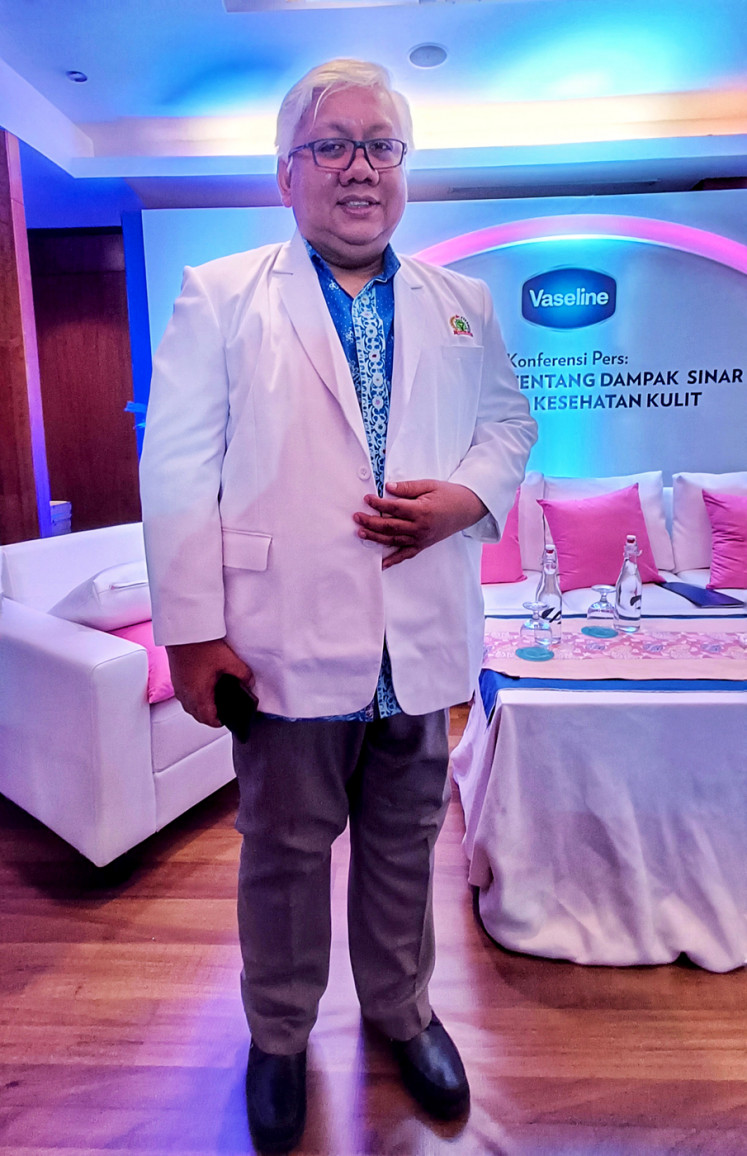Popular Reads
Top Results
Can't find what you're looking for?
View all search resultsPopular Reads
Top Results
Can't find what you're looking for?
View all search resultsExpert tips: How to reduce skin problems from face masks and hand sanitizer usage
Dermatologists talk about how to protect the skin while taking preventive measures against COVID-19.
Change text size
Gift Premium Articles
to Anyone
Dermatologists talk about how to protect the skin while taking preventive measures against COVID-19.
It seems that COVID-19 has yet to go. Since the infection rate dropped mid-year, many have become euphoric and lowered their guard against the pandemic. As a result, many became infected with the coronavirus when new variants emerged.
In Indonesia, the government has once again reminded people to wear masks in public, wash their hands and sunbathe to protect themselves against the virus. But these rules also have disadvantages for some people.
“I realize the danger of the virus,” Anjani, a front-office staff of a hotel in Bandung, West Java, said during a telephone interview on Dec. 5. “My family and I got [the virus] last year and fell ill. But wearing a mask [almost] all the time also causes my [facial] skin to break out.
“It feels like torture,” the 28-year-old confided. “It’s painful when the mask rubs against the acne [on my face]. And yet, I have to keep wearing [a mask] in public.”
‘Maskne’
Anjani is not the only one. Danang Triwahyudi, chairman of the Indonesian Society of Dermatology and Venereology (Perdoski) Jakarta Chapter, finds similar cases in his clinic almost daily.
The condition known as “maskne” is a skin irritation and breakout caused by wearing a face covering to protect against airborne viruses. Symptoms usually include pimples, blackheads, redness and swelling in areas covered by the mask.
“Wearing personal protective equipment may disturb the skin barrier and enhance the risks of infection and inflammation,” Danang said when interviewed after a skin health education session by Vaseline in Le Meridien Jakarta on Nov. 15. “And the condition is usually worsened by heat and humidity.”
People with oily skin types usually experience this breakout. “And most Indonesians have oily skin types,” he added.
Oily skin produces more sebum, a waxy substance generated by the skin’s sebaceous glands. While the importance protects the skin’s moisture level and makes it supple, excess sebum clogs pores and follicles, making them a favorable environment for bacteria to thrive.
“Those wearing the currently trendy duckbill masks are especially prone to maskne,” Danang said. “Duckbill masks are usually made of thick, non-absorbent materials. They cover the face tight and make it feel hot and sweaty. Under such circumstances, when the material rubs against the skin, it may cause irritation and infection.”
Prevention is always better than cure. Therefore, Danang advised wearing a mask with soft and breathable materials to avoid the condition.
“One of the best materials [on the skin] is cotton,” he added. “But unfortunately, cotton masks don’t give maximum protection against the virus.”
Another good alternative is surgical masks, which protect against the virus and are relatively gentler on the skin.
Henry Tanojo, a dermatologist at a skin clinic in Surabaya and Jember, East Java, agreed with his colleague.
“Wearing an N95 is only necessary when you work in a highly infectious environment,” Henry said during a telephone interview on Nov. 30. “Other than that, a surgical mask already gives enough protection against the coronavirus,” he said.
Both dermatologists advised us to go outdoors and take off our masks for 15 minutes every two or three hours to let our skin breathe. In addition, sweat-drenched covers need to be replaced immediately to prevent acne.
But what if we already have acne?
“You can treat [the condition] with over-the-counter ointments that contain Retinol or take DHA supplements,” Danang said. “But if the condition persists, you should immediately consult a dermatologist.”
The Perdoski Jakarta’s chairman also advised people with maskne to wear a mask without makeup.
“If possible, wash your face two or three times a day using noncomedogenic facial wash to help improve the condition,” he said.
Side effects: One of the slides of Danang Triwahyudi's presentation depicts skin problems caused by the use of personal protective equipment (PPE) as preventive measures against COVID-19. (JP/Sylviana Hamdani) (JP/Sylviana Hamdani)‘Contact dermatitis’
Echi, a housewife in Sunter, North Jakarta, was perplexed when her hands developed an itchy rash in mid-2020.
“I didn’t do or eat anything out of the ordinary, so I had no idea what might have caused the rash,” she said.
During an online consultation with a dermatologist, the 47-year-old was told that excessive use of hand sanitizers might have caused the condition, generally known as “contact dermatitis.”
“I used a hand sanitizer after touching almost everything,” Echi said. “I feared contracting the coronavirus, which was said to thrive on many surfaces.”
Henry has a patient who experienced a similar condition. “One of my patients got dermatitis because he was using a hand sanitizer with 90 percent alcohol,” he said.
According to Henry, the high alcohol content in the hand sanitizer irritated his patient’s skin and damaged his skin barrier, causing it to develop a painful rash.
“The higher the alcohol content [in hand sanitizers], the higher the risks of developing dermatitis,” Henry said. “Using [a hand sanitizer] too often is also bad.”
While soap is generally safer and gentler on the skin than hand sanitizers, excessive hand washing may also cause dermatitis.
“The detergent content in soap may also damage the skin’s barrier and cause irritation, which leads to dermatitis,” Danang said.
To reduce the risks of getting dermatitis, Danang suggested patients apply moisturizer right after washing their hands or using a hand sanitizer.
Another trick to prevent the condition is by reducing the frequency of hand washing and using hand sanitizers.
“The strategy is doing activities that dirty your hands one after another and then washing your hands [or using the hand sanitizer] once,” Henry said. “This way, you don’t have to clean your hands repeatedly.”
Top tips: Dermatologist Danang Triwahyudi is interviewed after a skin health education session held by Vaseline in Le Meridien Jakarta, on Nov. 15. Danang suggests wearing a mask with soft and breathable materials to avoid skin problems. (JP/Sylviana Hamdani) (JP/Sylviana Hamdani)Sunburn
People generally believe sunbathing in the morning will improve their immune system and boost their vitamin D levels. However, many forget the grave dangers that lurk behind sun exposure.
Research by Perdoski Jakarta reveals that Indonesia has very high ultraviolet (UV) levels, which may reach up to 10 and 11+ during the day. Therefore, people with lighter skin tones may experience painful sunburns after just a few minutes of sunbathing.
In addition, UV rays can enter the skin’s innermost layer and change our DNA, triggering hyperpigmentation, photoaging and skin cancer.
“We all have potentially cancerous cells, but thankfully, the body’s immune system eliminates them immediately,” Danang said. “However, when UV rays enter our skin, they lower our immune system, allowing the [cancerous] cells to grow out of hand.”
In Indonesia, skin cancer is in the top 10 most common cancers.
To get the best benefit from the sun and avoid skin cancer, the Perdoski Jakarta’s chairman suggested that we observe the UV Index of the city we live in before basking under the sun.
“It turns out that Jakarta’s UV Index level is already very high at 9 a.m.,” Danang said. “Therefore, at 9 a.m. [in the capital], we can only sunbathe for 15 minutes.”
Danang also advised sunbathing in tank tops and shorts to get maximum sun exposure during the short period.
But what if we get sunburnt?
“First thing’s first, we can soothe the pain by applying a moisturizer or anti-tanning lotion on the skin,” Henry said. “But if the condition worsens and the skin blisters, you should immediately consult a doctor.”
Henry also suggested an alternative to boost the immune system without jeopardizing the skin’s health: Take vitamin D supplements daily.
“It’s important to protect ourselves against the coronavirus,” Henry said. “However, it’s also necessary to protect our skin from the side effects of its prevention.”













